Much has been written about the discovery of America, and Christopher Columbus found himself in the middle of a battle so fierce and so dire, that most people, I think, did not like at all the implication that a man coming from a family oh humble origin, and a simple sailor, had performed such an enterprise as the discovery of America.

Christopher Columbus and an unknown pilot
by sol
Christopher Columbus found himself in the middle of a “battle for America.”
America before Columbus
Native peoples of America before Columbus.
Doubts about Columbus’ biography
Columbus’ voyage was the greatest event in the history of the world
Columbus’ biography was turned upside down, sowing doubts even about his Genoese origin, asserting that he was born in Portugal, and that he had surreptitiously taken advantage of mysterious and important nautical maps belonging to an unknown pilot, to lull everyone by making them believe that he only developed the idea of the route toward America.
But apart from a rather obvious attempt to discredit Columbus, there are many case studies devoted to pre-Columbian discoveries; and in this sense a very useful and important work of Professor Rafn became justly famous, and it was taken several times in order to prove that Northern sailors knew about America long before Columbus. J.J. Heit went further saying that even the ancient Greeks and Romans, the Phoenicians and the Egyptians knew about America. J.J. Heit quoted some passages from Homer, Plutarch, Aristotle, and from classical Greek and Roman literature (Pliny the Elder, Horace, Virgil, and Seneca), in order to prove that othershad discovered America many centuries before Columbus.
“Greek literature is replete with reference to Elysium, the home of heroes exempt from toil and death. Homer ( about 1200 BC) frequently refers to Elysium, placing it on the western verge of the earth […] He gives it a more or less definitely locality, his description seeming to imply tropical America, when he says:
No snow is there, nor yet great storm nor rain, but ocean always sendeth forth the breeze of the shrill west, to blow cool on men (Odyssey, I. 561) .
“I quote also […] the Latin poet Horace (65 BC), The unknown islands far away in the encircling ocean. And Virgil, Extending Rome’s domain beyond the limits of India and Africa to the spot where far away in the western ocean sustains the column of the heavens.”
In particular, J.J. Heit said he has chiefly devoted himself to the studies relating to Columbus’ times in order to reject an “unacceptable theory” proposed by the very skeptical scholar John Fiske, who “does not believe that pre-Colombian discoveries have bequeathed anything of geographical value.” But above all Riske had dared assert that Columbus’ voyage was the greatest event in the history of the world:
“This voyage was an event without any parallel in history,” Fiske said.
Regardless of how many people may say, I completely agree with Riske, beyond the fact that Columbus was Genoese or Portuguese (which isn't true); that he had seized the nautical map belonging to the mysterious unknown pilot (which may be true, but these are only hints and guesses); or that he was an ambitious go-getter (which should be true, because no one risks his own life between the mighty waters of the Sea of Darkness if fame and money aren’t the mainsprings that push him to persevere).
I agree with Fiske because I base my belief on the fact that too many people seem to forget that the discovery made by all those who have preceded Columbus had no consequence, and no repercussions or tangible practical significance. Although they arrived in America before Columbus, there they stayed and there they died. The whole world knew nothing of their fate or the discovery of a new world. America was first explored and populated only after Columbus’ discovery. It is for this reason that Fiske’s statement is absolutely true:
“This voyage was an event without any parallel in history.”
Fiske was right, and J.J. Heit was proved wrong by the facts.
Sources:
J.J. Heit, “Glimpses into Ancient American Discoveries”. Americana. New York City, The American Historical Society, January 1924-December 1924, pp. 385-398, p. 385, p. 387, p. 390. Idem, “Glimpses into Ancient American Discoveries”. Americana. New York City, The American Historical Society, January 1925, no. 1, pp. 20-35, p. 35.
J. Fiske, The Discovery of America, Boston & New York, Houghton Mifflin Company, 1892, Vol. I, p. 446.
America discovered in the Tenth Century, by Charles C. Rafn, New York, William Jackson, 102 Broadway, MDCCCXXXVIII [1838]. In Italian. C. Cristiano Rafn, Memoria sulla scoperta dell’America nel X secolo, Estratta dalle Memorie della Società Reale degli Antiquari del Norte, traduzione in italiano di Jacob Graberg, Pisa, Presso i fratelli Sistri, 1839, pp. 33-34.
You might also like
White Men in Florida before ColumbusWhite men pushed toward Florida. In the early Middle Ages, some white men pu...
Columbus’ juvenile travels before the discovery of AmericaAt the beginning of Columbus’ project of reaching the East-Indies.
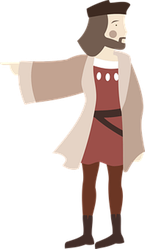

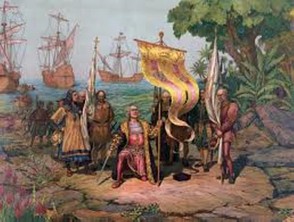
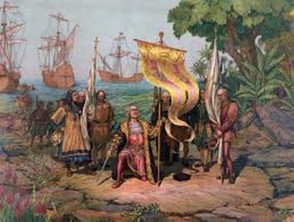

 The popular origin of English Freemasonryon 01/30/2019
The popular origin of English Freemasonryon 01/30/2019
 White Men in Florida before Columbuson 12/18/2016
White Men in Florida before Columbuson 12/18/2016
 Columbus’ juvenile travels before the discovery of Americaon 12/15/2016
Columbus’ juvenile travels before the discovery of Americaon 12/15/2016
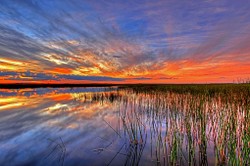
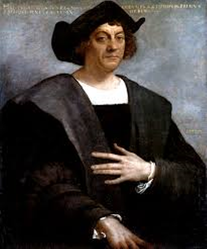
Comments
Archaeologists discovered a Norse settlement at L'Anse aux Meadows in Newfoundland. It dated from about a 1000-1100 AD.
I have seen television shows that seem to have artifacts such as stone carvings left behind by cultures from Europe, and there is much evidence of early visits. Just look at the Mi'kmaq people, a First Nation people of Nova scotia and nearly regions and compare it to the flag of the Knights Templar. It is far from likely Columbus was the first to come to America.
A very interesting study published by the prestigious Royal Society of Northern Antiquaries in 1839 (founded by Professor C. Christian Rafn) , gave us some valuable information based on C. Christian Rafn’s primary research work on the first inhabitants of America. Compiled from authentic documents and the most accurate sources of information, Professor Rafn stated that the Skrelinghi or Old Eskimos (from the Danish word Skvelling, little men) lived in more southern countries than today.